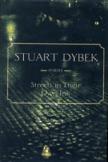Shadow Land
Postmodern poetry these days, as practiced by some leaders of poetic taste, shows little interest in communication. It juxtaposes unconnected bits that surprise us by their odd change of direction. Stuart Dybek’s slim volume comes as welcome relief. His poems actually compute.
Dybek, a professor of English at Western Michigan University, is unabashedly Chicagoan. His collections of prose fiction make capital of Chicago’s unpolished ethnic mix. The stories in Sailing With Magellan, for example, show us the roughhouse streets and gangland aura of a place called Little Village on the South Side, where the grade-school sisters have their hands full; still, for a gutsy youngster, a lot of life goes on. His story “Blue Boy” is a classic of the genre.
Chicago is announced in the first poem of this present book, “Windy City”: “In a city like that one might sail/ through life led by a runaway hat.” It appears more fully in “Autobiography,” where in nine segments Dybek parades the images of his Polish Catholic youth and neighborhood in the 1940’s and 50’s. His world was a mix of broken English, Catholic pieties, jazz saxophone and the lure of adult goings-on. A subsequent string of poems introduces us to his “ex-pug uncle Chino,” to “Ginny’s Basement” (where he gets a sneaky peak at sex) and to Election Day in one of Mayor Daly’s precincts.
A drawback of this early section of poems is, in fact, their narrative clarity. A prose writer feels the imperative to write in complete sentences and to use words unambiguously. Poetry, however, abounds in the more impulsive modes of exclamation and interrogation and desiring—or, as Dybek himself puts it later on, “barricades of syntax broken by emotion.” It plays with multiple meaning and pays a kind of musical attention to the line and its ending.
In mid-course of his collection, by way of the poem “Sleepers” and, later, “The Estrangement of Luis Leon,” Dybek swings into greater inventiveness with form and with matter, above all the matter of dreams. “Journal,” which shows a sexual relationship reworking itself into dream life, is a skillful example in that genre.
Two poem sequences merit attention. “Vespers,” the first, is a collage of loosely related twilight scenes, threaded with Catholic imagery. We get the sense of a world whose religious clarity is dimming, where the erotic impulse gets freer reign, yet where altar service, confessions, funeral processions and “the beads” still suffuse the memory. The poet muses, for example, on a crucifix in his old parish church. “In the glow of the sanctuary lamp/ his wounds were varying reflections of red,/ as if his bare, agonized body had been kissed/ by different shades of lipstick.” Dybek concludes “Vespers” with a glimpse of sailors who “float home” from a prodigal evening, leading the poet to this curt dialogue: “What’s all this suffering for, Father?/ Nothing, my Son...the same as all this love.”
The title, Streets in Their Own Ink, refers to the urban setting as an octopus of dark byways that tell their own story. Especially this is so with the concluding sequence, “Anti-Memoir.” “This is a street whose tentacles/ ravel about you, drawing you in,/ la calle en su tinta/ a street stewed in its own ink.”
“Anti-Memoir” is meant to read like a rumination on Edward Hopper’s painting of urban loneliness, “Nighthawks.” Nighttime is unkind to past moments of transient glory. At this hour, the street singer is mute. “Manholes vent/ the illusion of heat at the core/ of every spiritual world.” This is an “Anti-Memoir” because it does not record stellar moments or known personalities. Its subject is “the unremembered, unredeemed,/ ordinary, neither true nor false,/ and unaccountable as love.”
It is of benefit to view this shadow world, Dybek wants us to recognize. He says so in the lines that conclude both this poem and the book.
Alone, along a street that’s suddenly
like any other, you’re blessed
simply to continue
another night’s walk home.
This article also appeared in print, under the headline “Shadow Land,” in the February 7, 2005, issue.








